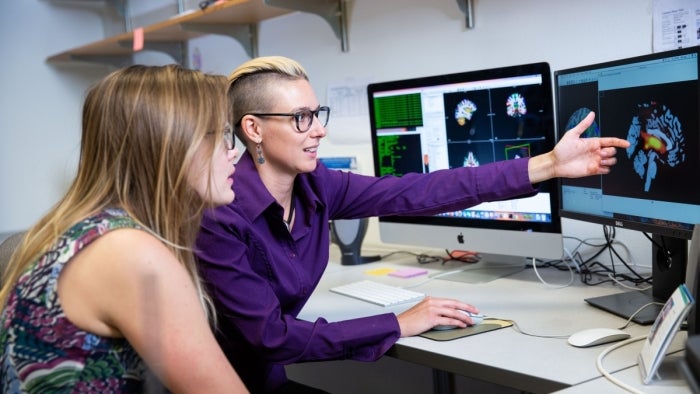The CDC estimates that more than 5 million adults in the United States have autism spectrum disorder (ASD), yet the condition and its effects on human cognition are still not fully understood.
“Autism as a diagnosis hasn't existed that long, and everyone thinks of autism as a childhood condition,” says B. Blair Braden, director of the Autism and Brain Aging Laboratory at Arizona State University.
Braden, an associate professor at ASU’s College of Health Solutions, has been researching autism and how it relates to memory challenges in adults since 2016. Thanks to a new grant from the National Institutes of Health (NIH), she will be able to expand upon an ongoing study that seeks to identify biomarkers and intervention targets in aging autistic adults.
According to the NIH, the research “will advance fundamental knowledge of brain aging vulnerabilities and mechanisms in ASD.”
The grant totals $3.3 million, with funds going toward staff salaries, equipment, participant compensation and hypothesis testing. The new funding will also allow the study to expand its reach into underrepresented communities where autism continues to be undiagnosed in many adults.
Because of the hereditary nature of autism, Braden’s team often evaluates parents and grandparents of autistic children who suspect they are also on the spectrum.
“A lot of people that come to our study, they have been undiagnosed their whole life,” Braden said. “Their child or grandchild is diagnosed with autism, and through that process, they learn more about autism. They realize that they are probably autistic, and then we're able to evaluate them.”
Braden’s study is conducted through participant questionnaires, cognitive tasks and neuroimaging tasks using an MRI.
This latest source of funding buoys her hopes for what the study may be able to accomplish by allowing her to work directly with more people.
“It's the best part,” Braden said, “… to have that more immediate impact in making people's lives better.”
The Autism and Brain Aging Lab is currently looking for adults 18 years and older with or without autism to participate in the study. Call 480-727-3970, email abalab@asu.edu or visit the lab’s website for more information.
Story by Aidan Hansen, communications assistant, College of Health Solutions
More Health and medicine
College of Health Solutions medical nutrition student aims to give back to her Navajo community
As Miss Navajo Nation, Amy N. Begaye worked to improve lives in her community by raising awareness about STEM education and health and wellness.After her one-year term ended last month, Begaye’s…

Linguistics work could improve doctor-patient communications in Philippines, beyond
When Peter Torres traveled to Mapúa University in the Philippines over the summer, he was shocked to see a billboard promoting Arizona State University.“It wasn’t even near the university,” said…

Turning data into knowledge: How Health Observatory at ASU aims to educate public
This is how David Engelthaler described his first couple of months on the job as executive director of the Health Observatory at Arizona State University:“It’s been a little bit of drinking from the…
